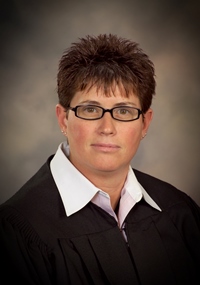
Judge Kathleen Lynch of Wyandotte County District Court was recognized by her peers at a recent judges conference for demonstrating innovation and leadership in how her court handles some of its busier dockets.
Lynch was given the Community Outreach and Education Award by the Kansas District Judge Association at a statewide conference for judges last month in Topeka. The award was presented to Lynch by Lawton Nuss, chief justice of the Kansas Supreme Court.
“I was honored and grateful to receive the award while at a conference with my fellow Kansas judges,” Lynch said. “It allowed me to immediately share my insights for what has worked in Wyandotte County, so a similar approach might be tried in other district courts.”
The Community Outreach and Education Award is given annually to a member of the Kansas judiciary who demonstrates extraordinary leadership and service in educating the public about courts and the judicial branch, with emphasis on developing public trust and confidence, and supporting access to justice and fairness.
Lynch was nominated by Wayne Lampson, who is chief judge of the Wyandotte County District Court.
“Judge Lynch made significant changes in the paternity docket and the protection from abuse and stalking dockets, which improved services provided to people before the court and reduced the number of problems these very difficult cases can have,” Lampson said.
One change introduced by Lynch was a partnership with the county mental health center, Wyandotte County domestic court services and the Wyandotte County court trustee to create a supervised visitation and exchange center for families in high-conflict divorce or paternity cases, or cases involving domestic abuse. The center is supported by a monthly fee its users pay.
Lynch also forged a partnership with the Wyandotte County court trustee to file instantaneous paternity actions for parties involved in the protection from abuse or protection from stalking docket. This allows for orders to be entered quickly to address parenting assessments through the court’s domestic court services, to determine proper child support and enforcement through the court trustee, and to establish an appropriate parenting plan using the supervised visitation and exchange center.
“Since we started instantaneous paternity actions in 2013, filings on the protection from abuse and protection from stalking docket have decreased by almost 50 percent,” Lampson said.
Lynch, who was largely responsible for the idea, said, “When courts help families come to an understanding on all the underlying issues, instances of abuse between the parties are greatly reduced.”
Another Lynch initiative involved training law enforcement on crisis intervention techniques officers can use when they encounter someone who is mentally ill. This training will soon be delivered to the Kansas City, Kan., Fire Department.
She also organized monthly staffing of the mental health docket by community partners, including the county mental health center, the district attorney’s office, defense attorneys who work in this field, and municipal court judges and prosecutors.
Lynch also participated in a mapping initiative to identify gaps in the criminal justice system as it relates to the mentally ill. As a result, she was able to establish a jail diversion program in partnership with the Wyandotte County Sheriff, the county mental health center, and the Heartland Regional Alcohol and Drug Assessment Center.
A process Lynch implemented allows for in-court reviews for involuntary commitments to better determine the status of the consumer and the services provided. This effort resulted in a 50 percent reduction in revocations related to commitment orders.
– Story from Kansas Supreme Court Office of Judicial Administration
